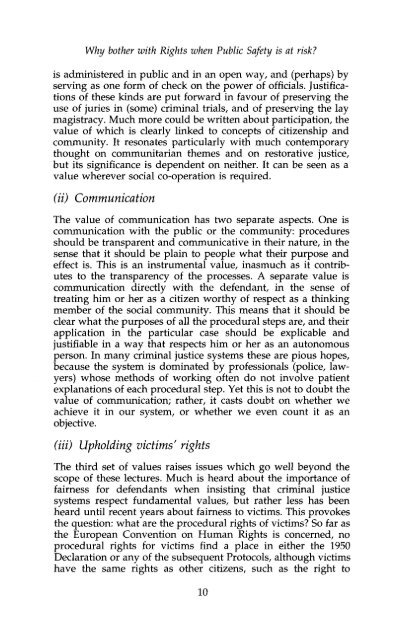Human Rights, Serious Crime and Criminal Procedure - College of ...
Human Rights, Serious Crime and Criminal Procedure - College of ...
Human Rights, Serious Crime and Criminal Procedure - College of ...
- No tags were found...
Create successful ePaper yourself
Turn your PDF publications into a flip-book with our unique Google optimized e-Paper software.
Why bother with <strong>Rights</strong> when Public Safety is at risk?is administered in public <strong>and</strong> in an open way, <strong>and</strong> (perhaps) byserving as one form <strong>of</strong> check on the power <strong>of</strong> <strong>of</strong>ficials. Justifications<strong>of</strong> these kinds are put forward in favour <strong>of</strong> preserving theuse <strong>of</strong> juries in (some) criminal trials, <strong>and</strong> <strong>of</strong> preserving the laymagistracy. Much more could be written about participation, thevalue <strong>of</strong> which is clearly linked to concepts <strong>of</strong> citizenship <strong>and</strong>community. It resonates particularly with much contemporarythought on communitarian themes <strong>and</strong> on restorative justice,but its significance is dependent on neither. It can be seen as avalue wherever social co-operation is required.(ii) CommunicationThe value <strong>of</strong> communication has two separate aspects. One iscommunication with the public or the community: proceduresshould be transparent <strong>and</strong> communicative in their nature, in thesense that it should be plain to people what their purpose <strong>and</strong>effect is. This is an instrumental value, inasmuch as it contributesto the transparency <strong>of</strong> the processes. A separate value iscommunication directly with the defendant, in the sense <strong>of</strong>treating him or her as a citizen worthy <strong>of</strong> respect as a thinkingmember <strong>of</strong> the social community. This means that it should beclear what the purposes <strong>of</strong> all the procedural steps are, <strong>and</strong> theirapplication in the particular case should be explicable <strong>and</strong>justifiable in a way that respects him or her as an autonomousperson. In many criminal justice systems these are pious hopes,because the system is dominated by pr<strong>of</strong>essionals (police, lawyers)whose methods <strong>of</strong> working <strong>of</strong>ten do not involve patientexplanations <strong>of</strong> each procedural step. Yet this is not to doubt thevalue <strong>of</strong> communication; rather, it casts doubt on whether weachieve it in our system, or whether we even count it as anobjective.(Hi) Upholding victims' rightsThe third set <strong>of</strong> values raises issues which go well beyond thescope <strong>of</strong> these lectures. Much is heard about the importance <strong>of</strong>fairness for defendants when insisting that criminal justicesystems respect fundamental values, but rather less has beenheard until recent years about fairness to victims. This provokesthe question: what are the procedural rights <strong>of</strong> victims? So far asthe European Convention on <strong>Human</strong> <strong>Rights</strong> is concerned, noprocedural rights for victims find a place in either the 1950Declaration or any <strong>of</strong> the subsequent Protocols, although victimshave the same rights as other citizens, such as the right to10
















